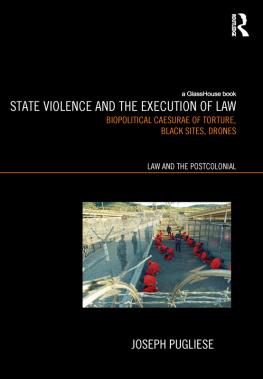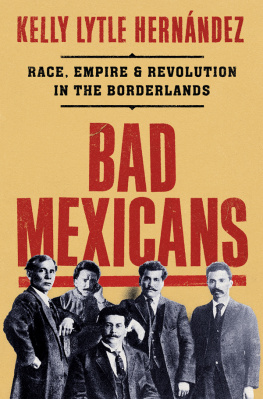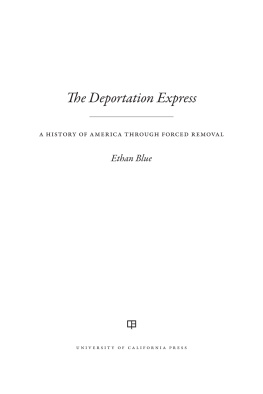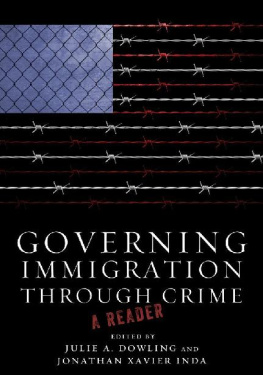Contents
Guide
Pagebreaks of the print version
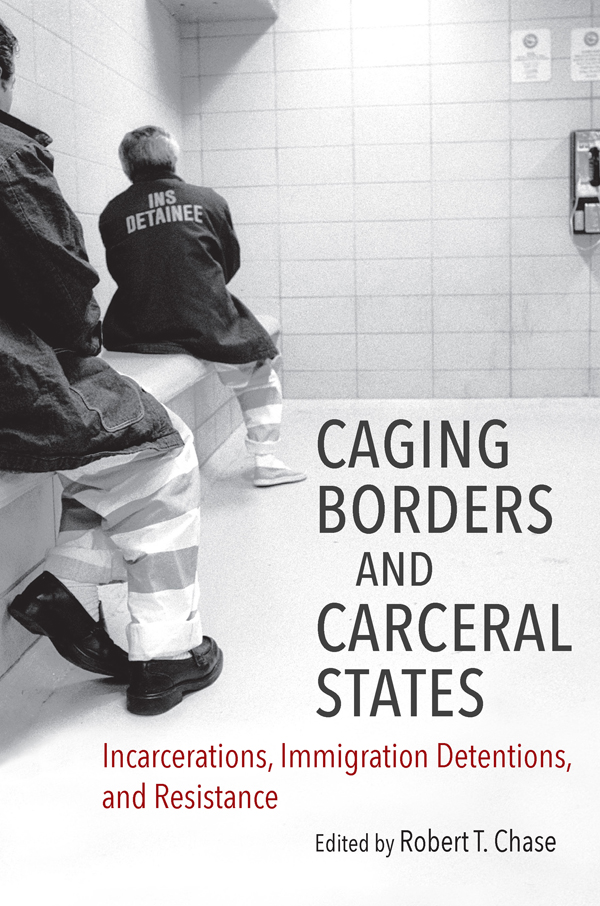
Caging Borders and Carceral States
Justice, Power, and Politics
COEDITORS
Heather Ann Thompson
Rhonda Y. Williams
EDITORIAL ADVISORY BOARD
Peniel E. Joseph
Matthew D. Lassiter
Daryl Maeda
Barbara Ransby
Vicki L. Ruiz
Marc Stein
The Justice, Power, and Politics series publishes new works in history that explore the myriad struggles for justice, battles for power, and shifts in politics that have shaped the United States over time. Through the lenses of justice, power, and politics, the series seeks to broaden scholarly debates about Americas past as well as to inform public discussions about its future.
More information on the series, including a complete list of books published, is available at http://justicepowerandpolitics.com/.
Caging Borders and Carceral States
Incarcerations, Immigration Detentions, and Resistance
Edited by
ROBERT T. CHASE
The University of North Carolina Press
Chapel Hill
This book was published in association with the William P. Clements Center for Southwest Studies at Southern Methodist University by the University of North Carolina Press.
2019 The University of North Carolina Press
All rights reserved
Set in Adobe Text Pro by Westchester Publishing Services
Manufactured in the United States of America
The University of North Carolina Press has been a member of the Green Press Initiative since 2003.
Library of Congress Cataloging-in-Publication Data
Names: Chase, Robert T., editor.
Title: Caging borders and carceral states : incarcerations, immigration detentions, and resistance / edited by Robert T. Chase.
Other titles: Justice, power, and politics.
Description: Chapel Hill : University of North Carolina Press, [2019] | Series: Justice, power, and politics | Includes bibliographical references and index.
Identifiers: LCCN 2018043534| ISBN 9781469651231 (cloth : alk. paper) | ISBN 9781469651248 (pbk : alk. paper) | ISBN 9781469651255 (ebook)
Subjects: LCSH : ImprisonmentSouthern StatesHistory20th century. | ImprisonmentWest (U.S.)History20th century. | Race discriminationUnited StatesStatesHistory20th century. | United StatesEmigration and immigrationHistory20th century. | Detention of personsUnited StatesHistory20th century. | Southern StatesRace relationsHistory. | West (U.S.)Race relationsHistory.
Classification: LCC HV 9466 . C 34 2019 | DDC 365/.9730904dc23
LC record available at https://lccn.loc.gov/2018043534
Cover photo: Pakistani (left) and Mexican detainees inside federal detention facility, Baltimore, Md., 10 January 2002. Steven Rubin.
Keramet Reiters The Path to Pelican Bay: The Origins of the Supermax Prison in the Shadow of the Law, 19821989 was published in a substantially different form as Constructing the Supermax: One Rule at a Time, in 23/7: Pelican Bay Prison and the Rise of Long-Term Solitary Confinement (New Haven, CT: Yale University Press, 2016), 87120.
Donna Murchs The Clintons War on Drugs: Why Black Lives Didnt Matter originally appeared in False Choices: The Faux Feminism of Hilary Rodham Clinton , edited by Liza Featherstone (New York: Verso Books, 2016).
The Scorpions Tale: A Borderlands History of Mexican Imprisonment in the Sunbelt is an abbreviated and revised version of the Scorpions Tale, chapter four in Kelly Lytle Hernndez, City of Inmates: Conquest, Rebellion, and the Rise of Human Caging in Los Angeles, 17711965 (Chapel Hill: University of North Carolina Press, 2017), 92130. Used here with permission.
Contents
ROBERT T. CHASE
DAVID MANUEL HERNNDEZ
ETHAN BLUE
KELLY LYTLE HERNNDEZ
GEORGE T. DAZ
TALITHA L. LEFLOURIA
PIPPA HOLLOWAY
VIVIEN MILLER
HEATHER MCCARTY
VOLKER JANSSEN
KERAMET REITER
DONNA MURCH
DAN BERGER
DOUGLAS K. MILLER
Figures and Tables
Figures
. Steven Rubin, Handprints, Federal Detention Facility, Seattle, Washington, 2001 ,
. Jose Cortez, Fourth Anniversary Thirty Minutes Behind the Walls Texas Penitentiary Broadcast ,
. George Jackson being led to court, circa 1971,
Tables
. Restoration of civil rights for female convicts, 19211945,
. Changes to Division of Corrections road prisons, 19661967,
Acknowledgments
From the beginning, the idea behind this anthology was to build connections between diverse fields of scholarship that considered the carceral state across different regions, times, and spaces. I think in this endeavor the project met its aim and left me, as editor, with many to thank and appreciate.
This project first began at the Clements Center for Southwest Studies, a foundational research institution at Southern Methodist University whose gracious support of an annual cohort of postdoctoral research fellows always results in a vibrant intellectual space of scholarship and intellectual dialogue. When Benjamin Johnson first suggested the idea of this collection to me in 2009, the field of carceral studies as a subject of history was still developing and not yet fully formed, but that only made the prospect of helping to shape such a pioneering field all the more exciting. At that time, David Weber, the Clements Center founding director and one of the countrys leading pioneers of borderlands scholarship, welcomed the idea of an anthology that would consider how incarcerations and migrant detentions were interconnected in the U.S. Southwest. Although David was in a life struggle with cancer at that time, he was always so welcoming and supportive to young scholars with new ideas. As the dynamic trio of scholarly leadership for the Clements Center, David, Sherry Smith, and Benjamin Johnson immediately saw the benefit of bringing together a diverse group of scholars in a variety of academic fields to consider how incarcerations, migrant detentions, and resistance shaped borders, interconnections, and regional variety and difference. I owe them great thanks for having supported such a project before there was even much published literature from historians to justify its aim. As the project developed from conceptual idea to book, the Clements Centers stewardship changed hands to that of Andrew Graybill, who offered this anthology a wealth of ongoing support, guidance, and mentorship from workshop stage to public seminar to editing and final revision. We thank the Clements Center for all the gracious financial, intellectual, and personal support it provided to bring this anthology to fruition.
In the fall of 2011, the Clements Center partnered with the Center for the American West at the University of Colorado, Boulder, to host our first workshop seminar. As an early introduction to one anothers contributions, the workshop series brought together many new approaches to carceral studies that led to a thought-provoking seminar and a day of vibrant exchange. We especially appreciated the opportunity to put the collective scholarship of the contributors in dialogue with the incredibly dedicated activists and collaborators whom the Center for the American West made available to our authors. Many thanks to Patty Limerick and Kurt Gutjahr for hosting the seminar, supporting our collective work, and formally launching the project and wider scholarly conversation.
During the spring of 2012, we held a public seminar, then entitled Sunbelt Prisons and Carceral States: New Frontiers of State Power, Resistance and Racial Oppression. The conference participants included the anthology contributors alongside a final evening panel that invited our authors to engage in a public dialogue with formerly incarcerated activists, civil rights attorneys, and policy makers. Many thanks for the incredible dialogue and the active participation of Representative Eddie Bernice Johnson (Thirtieth District of Texas); Ernest McMillan, activist and founder of the Fifth Ward Enrichment Program; Ray Hill, activist and founder of the Prison Radio Program; William T. Habern, civil rights attorney and state expert on postconviction law; Lisa Graybill, then a civil rights attorney for the American Civil Liberties Union; and Rick Halperin, activist and director of the programs cosponsor the Embrey Human Rights Program at Southern Methodist University. Their participation made the seminar more than an academic conference, transforming it into a forum for public engagement on the urgent crisis of mass incarceration. For helping it reach an even wider audience, we thank David Babb of the Prison Radio Show, who aired the public panel live on KPFT Radio 90.1. We also thank activists Michael Jewell and Joan Covici, who kept the conversation going by opening their home to us as an after-conference reception. Thanks and appreciation to Norwood Andrews, who collaborated with me on the call for papers, the author selection, and the organization of the two conferences. Organizing and editing a volume of this kind required the emotional and personal support of Gloria Rios, who was always there for me when needed. The incredible behind-the-scenes organizational work of the Clements Centers executive directors Andrea Boardman and Ruth Ann Elmore was beyond invaluable and made possible both the workshop and the public seminar. I am very thankful to Andrea and Ruth Ann, who do so much to make good scholarship part of a public dialogue.


